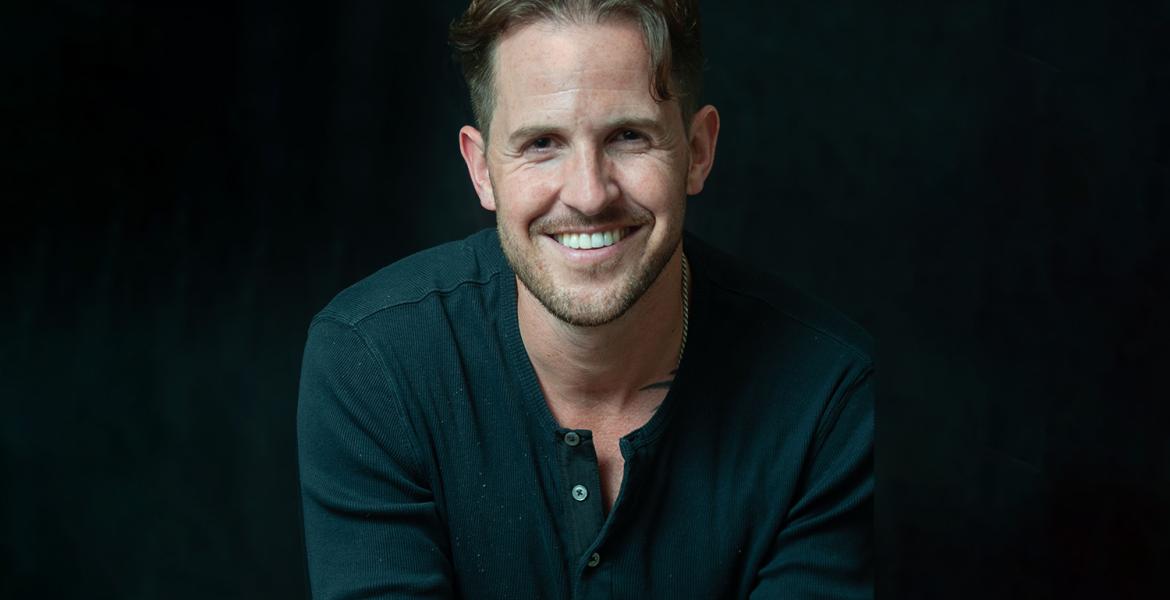Dan Jones in Conversation: The Essex Dogs Trilogy
Amidst the beautiful surroundings of Georgian Bath, Dan Jones, historian, writer, television personality, takes a moment to breathe. He's earned it: almost at the end of his book tour, promoting the second instalment of his bestselling Essex Dogs trilogy, Wolves of Winter, he has still squeezed in time to write and present podcasts and television shows, as well as drafting a new historical biography. In the not too distant future, he will be back writing the third Essex Dogs book. But for now, he can spend an hour to wind down, sip a local beer, and natter about the road so far.
Tell me about your new book, Wolves of Winter.
Wolves of Winter is the second instalment in the Essex Dogs trilogy. Essex Dogs was the first, which came out last autumn and covered the Crécy campaign in summer of 1346. Wolves of Winter continues literally the next day, and it's the second part of that campaign, which historically people don't really connect with Crécy. We've got this idea that the Crécy campaign happened for seven weeks, there was a big battle, and then everyone must have gone home. They did go home, but via Calais, which was besieged for 11 months from early September 1346 all the way through the winter into the spring, and then actually through the summer of 1347 as well, culminating – I don't think this is too much of a spoiler – in the famous scene captured by Rodin’s sculptures of The Burghers of Calais, of the leaders of the city coming out with nooses around their necks to offer the keys of the city to Edward III. So Wolves of Winter tells the story of that siegeA military operation in which enemy forces surround a town or building, cutting off essential supplies, with the aim of compelling those inside to surrender.. It's much less famous than Crécy, but in many ways it's a more exciting story. It doesn't have the finality of a battle, which makes it an interesting topic to deal with in fiction. However, it has the most incredible detail to it: involving pirates running the English blockadeBlocking a place to prevent goods or people from entering or leaving.; involving the building of a huge English siege town on the marshes outside Calais called Villeneuve le Hardi; involving the politics of the cities of FlandersThe modern area of northern Belgium and historically a territory in the Low Countries. that are all around; involving Queen Philippa as well as King Edward; and, as I've tried to concentrate on in Wolves of Winter, involving merchants and money, and the economic aspect of the Hundred Years War, which I think is sometimes neglected in favour of the dynastic.
It must be difficult trying to keep those heavy topics approachable when writing fiction.
I tried to keep it exciting. The problem is never that the material is too heavy, but is not to get bogged down in the historical complexity. I've tried to approach these novels with serious historical intent whilst also maintaining an exciting, fast-moving story. That balance means delivering the history in an active narrativeA story; in the writing of history it usually describes an approach that favours story over analysis. way, but that's not too far from what I've always tried to do with nonfiction. There is a difference, but there are areas of overlap. I think that's the reason why people over the years have asked me several times if I'd like to do historical fiction. I said ‘no’ a lot of times, because I was busy writing. But when it was 2019, I was asked again and I had an idea, which was the Essex Dogs trilogy. I knew Powers and Thrones would be done soon enough, and that was my tenth book, and I was turning 40, so it felt like the right time to try to do it. The assumption was that my nonfiction would transfer into my fiction, but it hasn't been that simple or straightforward. It's been very, very difficult, actually, but the right kind of difficult. It's been a great challenge that I've sometimes enjoyed. At times it's driven me almost to distraction, but I've felt like I've learned something. As a writer, when you hit your 40s – or certainly when you hit the point in your career that I was at – I didn't want to get complacent, lazy, stop learning, just start churning it out. I want to feel uncomfortable.
So what are the challenges?
Everything is a challenge! In some senses, it's a physically different working day. I'm quite a focused, fairly intense nonfiction writer, and very architectural and structural. I'd been told by very successful and eminent writers of historical fiction, like George R.R. Martin and Bernard Cornwell, that architecture wasn't necessarily always going to work for fiction. George R.R. Martin refers to ‘architects’ and ‘gardeners’: he says the architect builds a plan and writes to it, and the gardener plants a seed and lets it grow. I was very much an architect and had to learn to become a gardener. Part of that was physical: I had to relax, do some yoga, lie down, dream. I found it really hard to do that, to get into the right frequency. I've learned how to do it now: it's like a magic eye puzzle, where you have to relax your eyes for the image to come out. Things I thought would be difficult, like writing dialogue, have come very easily. But the sense of being at sea without the history to guide, and no really detailed architectural plan, has been the hard thing for me.
Yet you wrote Wolves of Winter in five months?
I had to. We wanted one year maximum between book one and book two. So that meant when I finished touring Essex Dogs in autumn 2022, I had to leg it into my office and start writing. I had characters and I had the first book of the trilogy, so not everything was being invented from scratch, and, of course, I'd had the experience and the confidence of having written one novel already. But second novels are difficult anyway. All novels are difficult, but with this one there was a real time pressure: if we missed the deadline, we missed the publication slot and that would be bad creatively and commercially.
So I just doubled down. I'd just finished reading on audiobook Walter Isaacson's biography of Elon Musk and was quite triggered, as the kids say, by Musk's demonic urgency mode, where he's got something to achieve and arbitrarily cuts the deadline by 60 or 70 per cent so that all the teams say it's completely impossible. Then he beats them until they do it, and they realize it's possible to do. I'm not claiming I'm sending rockets to Mars or changing the whole foundation of human energy use or building robots, but there's something to be said for catastrophically cutting a deadline and then manically working towards it. I think the energy that comes from doing that comes through in a book. I've done comparable things before: I wrote Crusaders in seven months; I wrote Powers and Thrones in 13 months. Those are my last two big nonfiction books. But five was spicy and the pressure of doing it at all was quite intense because I was also making a TV show and writing and recording podcasts. But the cliché is if you want something done, give it to a busy person.
The amount of activity was challenging, but also the story's challenging. The Siege of Calais is a brutal, brutal, brutal story. And you've got to lean into that, to make something out of it that both captures the reality of medieval warfare, but also has a deep humanity to it. So, emotionally it was really intense. Maybe that intensity, when I look back on the book with some perspective, will be the thing that I like most about it, and that wouldn't have been possible to achieve without trying to work to a near-impossible deadline.
Did you find, when you were writing the second book, that you were regretting having taken certain characters in a particular direction in the first book?
Probably regret wasn't the feeling, but I was annoyed with my past self for stitching my present self up – I was like, 'Shit: such and such is dead!', or I'd written myself into a corner. But it's good to be cornered, because then you fight your way out and there's a real energy to the writing. Because I'm trying to create books that have a certain sense of historical verisimilitude, it has to be abrupt and awkward sometimes, and it has to feel like 'What just happened?!' because that's how history feels. I think readers can smell plot armour for characters a mile off; I think they can smell off-the-shelf plot structures a mile off. I felt like if I was annoyed, frustrated, surprised, inconvenienced by a plot line, often which would just come to me without planning, it's probably a good thing, even if for me as the writer it was vexing.
In Essex Dogs there are certain elements – like drug addiction – that surprised me. Where does this come from? Have you got the evidence for this?
The Romford storyline in Essex Dogs is one of apothecary raiding, and that theme is carried through in a different way in Wolves of Winter. In a sense there are lots of ways to look at these books. One of them is in terms of the way I conceived it, which was standing on Omaha Beach on 1 January 2019 and thinking about D-Day, but thinking, 'What if D-Day, but 12 July 1346 instead of 6 June 1944?' What does a story about a medieval invasion of Normandy look like if you give it the attack and the urgency of a twentieth-century American war story? That tonally was what I first thought might be interesting and has carried through in a way. And you can't write an American war book without having a junkie in it! With Romford, I've kept it within the realm of plausible possibility and I hope plausibility, but of course it's pushing it to the edge in the sense that we don't have reams of chronicle evidence from the fourteenth century of mad junkies running around looking for their next fix. But there's an indulgent aspect to doing historical fiction where you do get to make stuff up, and I felt like it would be remiss not to gratify that in some ways.
That's part of the game and the reader is in on the game. I'm a big fan of Lee Child's Jack Reacher books. Reacher is as much of a superhero as Superman or Batman or Iron Man, but Lee Child's genius is to make this always feel just about possible. My favourite denouement to a Reacher book is when Reacher faces down the big boss, who’s spent the whole book breaking people's legs, and the end boss pulls out a pistol and shoots Reacher in the chest. Fortunately, Reacher's so stacked that the bullet doesn't go through his incredibly muscly chest. That can't happen, but Lee's genius is to hold you so wrapped in his storytelling that you'll go along with it. That's the art of great fiction, and you've got to lean into that game because it's fun. I think readers – I'm speaking of myself as a reader – respect that.
I really applaud the way you've managed to elbow in a strong female character. How easy did you find that to do?
It was hard when I was writing Essex Dogs. Sony Pictures had a three-year option on it, while I was writing it, for television adaptation, but none of their companies took it up. I think partly it was because of the mood of TV commissioning at the moment – that producers must always be cognizant of – which is that if it doesn't have a kick ass female character at its heart, no one will watch it. Now, I have an opinion on whether that's true or not, but it's the reality of the industry. I resisted gentle urges while I was writing Essex Dogs to build this story around a strong female character, but it just isn't medieval war. Medieval warfare is essentially something that is done by men. It is a masculine activity, and I was interested in writing a book about a group of men and how men behave in times of great stress. The main role for women in Essex Dogs would have been as victims of war, and it would have ended up being 'war porn' of the sort I wasn't interested in writing. Wolves of Winter is different because it's set in a fully realized siege town in which the queen comes over and lives in the camp for a while. There are all the women of her court and it's a wooden siege city, with a population bigger than any English city except for London at its biggest. So there's more scope to open up the world from this tightly knit band of brothers. When I read Essex Dogs back, I did see that there's one interesting female character in it, so I decided to make more of her. She allowed me to do certain things plot wise, as well as adding different layers of texture to the storytelling. There's another female character called Hircent who's sort of a rival to Scotsman in there as well.
You said it's going to be a trilogy, but it feels like there's so much scope to keep on going. Are you tempted?
I'm trying to work it out at the moment. I sketched out expanding it to five or six books, and got quite far along that path, talking to publishers about it. I wrote the plot summaries for the next three books. They weren't bad. At least one of them I could see working as a standalone book. But I've changed my mind because it was conceived as a trilogy. I've written the first two books thinking it was going to be a trilogy, and I think I will do something that I can't predict now that won't be good for the story. By extending the series, book three would probably be rubbish, because characters would start getting plot armour. I would start trying to hang on to things thinking, ‘I've got to spin three more books out of this'.
That being said, readers seem to have enjoyed this type of medieval storytelling, this worldview that I've created in the books. So, I'm more inclined now to view it as the Essex Dogs universe, like the Marvel Universe. There's a style and an approach to historical storytelling, and there are certain themes and attitudes that characterize the narrative. My thinking at the moment, which I reserve the right to change completely tomorrow, is that I will remain within this. It might be that there's a second Essex Dogs trilogy set before or after the current one. It may be that there are further standalone novels. I could imagine, for example, if we went backwards in time, doing an interesting one about the death of Edward II, and his disappearance or not, and having some Essex Dogs characters from book one, maybe even book two, wipe across the narrative. But I'm not going to devote the next ten years of my life to just doing historical fiction, because I've got lots more history that I want to write. I'm also doing podcasting work and television work, and I don't want to stop doing any of that stuff.
Have you got any ideas for history books?
I've been writing a biography of Henry V that's coming out next year. He's totally fascinating. Everyone mentions the terrible hair, but if you had a face-on portrait of Henry V instead of the profile one, no one would look at the hair. You'd look at the huge scar down the side of his face from the Battle of Shrewsbury in 1403, when Henry as Prince of Wales was hit by an arrow. John Bradmore, Henry IV’s surgeon, made notes about taking the arrowhead out of Henry's face when the prince was 16. It's harrowing: it was about a thirty-day operation, where they kept opening the wound to kept it clean. Bradmore designed these new tools, a speculum type of thing that went in and pulled that arrowhead out, millimetre by millimetre by millimetre. It's astonishing Henry didn't die. Michael Livingston, who wrote the most recent academic book about Henry and Bradmore, suggests – and I think it can only ever be a suggestion – that if you survive that, and it's the early fifteenth century and you're 16, you would be inclined to think that God had saved you for a purpose. So it's possible to read into Henry V's adult character the legacy of that terrible injury and his survival, although I’m not going to hang my book on that.
The whole of Henry V's childhood has been either misunderstood or overlooked. Because of Shakespeare primarily, I suppose, everyone thinks that Henry V's lessons are learned in his father's reign. I believe that many of them are learned in Richard II's reign. When he's a child, he's up close and personal with Richard II. Throughout his childhood, from a very young age, he sees Richard: he's in London during the Revenge Parliament of 1397. We know that his father hires a merchant's house a few doors down from where the Savoy was, and they have a party. Richard comes and Henry at that time is nine years old, and he sees the king at his maddest. Richard takes him to Ireland on the campaign from which he returns to lose his throne to Bolingbroke. He sees it all, and at such a formative age. All of that's been overlooked. So my biography of Henry V is weighted very differently from other biographies.
What are you doing at the moment for television?
I did a show for Sky History with Amanda Holden, Sex: A Bonkers History. That was enormously good fun. It’s like Horrible Histories meets Eurotrash, and it's rated super well. It’s genuinely original and new, and although the subject’s timeless, it’s a really funny, irreverent, human way to approach history that’s not ponderous or didacticIntending to teach, particularly to teach a moral. or hectoring. A lot of history at the moment in all media is extremely finger-wagging and either telling off the viewer for their prejudices or telling off history for not conforming to twenty-first century ethics and morals. It's very tiresome, so to step away from that mode of storytelling to something that's cheeky, slightly anarchic, sexy, funny, with a core of historical information is really good fun.
It's a weird time for history on TV at the moment. The most recent golden age in UK network TV commissioning was when I started making stuff in 2013, when every channel was commissioning loads of presenter-led history, budgets were decent, it was still quite experimental, and advertisers were for it. That's all collapsed. There will still be a Mary Beard show and a David Olusoga show and a Simon Schama show once a year. I'm not knocking any of those – those historians are all great – but we've retreated back to the tried-and-tested programmes. The streamers will only do either extremely polemicA strong verbal or written attack on someone or something. stuff, mostly American-focused true crime, or huge-scale stuff narrated by A-list celebrities. There's no middle anymore. Of course, the podcasting world is booming, I think because TV's got so cautious and sclerotic and impoverished that a lot of historians are just doing it for themselves. I've been working with Sony Music for the last 18 months. It's been fantastic. It reminds me of going back to those days when I started working for Channel 5. They're fast moving, willing to take risks, willing to try things, with great production values, talented people working on it, really big audiences.
If you were to have a dinner party, who would you invite from history?
Henry V because I need some new information for the biography. Genghis Khan to bring the fermented mare's milk for after dinner. Theodora, Empress of Rome. Napoleon for jokes. Boudicca. Joan, the Fair Maid of Kent, eventual wife of the Black Prince, because she's a good time.
You can buy Essex Dogs, the first instalment of the trilogy, here. The second book, Wolves of Winter, is available to buy here.
Picture © Peter Clark
- Log in to post comments






